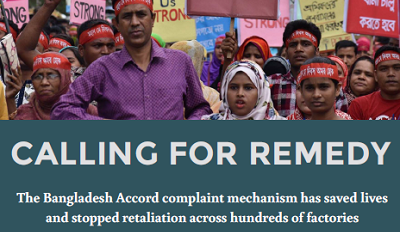
Publication Date:
May 15, 2019
The Accord on Fire and Building Safety in Bangladesh has taken away the fear of entering the workplace for garment workers across the 1,674 factories it covers. Next to the inspections on fire, electrical, and structural safety that the Accord is most widely recognized for, it also operates an extensive Worker Participation program which includes a Safety and Health Complaints Mechanism. Through the Accord’s All Employee Meetings and in-depth occupational health and safety committee trainings, over 1.6 million workers – the majority women – have received information on how to identify hazards and report them using the complaint process.
Independent investigations by credible experts are crucial for workplace safety, but inspections alone do not change worker-management communications. The people who work daily in the factories are key to making workplaces safer. Thus the Accord has an accessible, rights-based and confidential complaint mechanism, which functions in tandem with the independent inspectorate. Workers themselves and their representatives are best placed to notice and alert complaint handlers about new health and safety issues as well as to monitor the ongoing remediation of those violations. The Accord’s complaint mechanism is one of the tools workers have to report concerns about health and safety hazards without fear of employer retaliation, and if they choose, anonymously.
There are other complaint systems associated with factory safety inspection programs, but our review of the cases reported indicates these are inadequate. For example, Bangladesh’s Department of Inspections for Factories and Establishment manages a complaint system that is available to garment workers; however, its online database reports that DIFE has received only 25 complaints since 2014, none of which were in the category of workplace safety. In comparison, the Accord reports 1,329 complaints during the same time period, of which 917 related to occupational safety and health. A major difference between the two complaint mechanisms, which may influence the extent to which workers access them, is that the Accord allows for anonymous and confidential complaints, whereas DIFE does not.
This report analyzes the structure and procedures of the Accord’s complaint mechanism, worker and union complaints received by Accord staff, Accord responses, and resolutions reached. Additionally, it draws on worker interviews conducted in October 2018, which we feature in two factory case studies. Through this research, we find that the Accord’s complaint mechanism:
- Is an independent and responsive avenue through which garment workers in Bangladesh are regularly raising concerns of safety violations.
- Provides responsive and meaningful action and is successful at securing remediation. As a result, workers are increasingly more likely to trust and use the complaint mechanism.
- Ensures that workers are able to exercise their right to refuse dangerous work.
- Protects workers from retaliation.
- Provides apparel brands and retailers with knowledge of factory-level issues that would otherwise go undetected and unreported, allowing them to remediate.
- Provides transparency by publicly reporting on all complaints received, with details about their current status and resolution.
- Reduces potential gender bias in worker access, because, through the Accord’s training program, all workers in each factory receive information about how to use the complaint mechanism.
An essential policy of the Accord complaint system is a commitment by the secretariat to always take action when retaliation against workers who raise health and safety concerns is brought to its attention. Without intervention mandated by the Accord, many workers who were fired after raising the alarm over risks and hazards they perceive would not have been rehired. The prevalence of this retaliation indicates that reprisals against workers who raise complaints in non-Accord covered factories is likely much higher, as factory management are not held accountable.
The success of the Accord’s independent complaint mechanism is one of several reasons why the work of the Accord should be allowed to continue until credible alternatives for all aspects of its work are in place.

